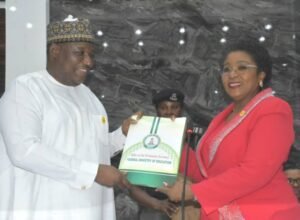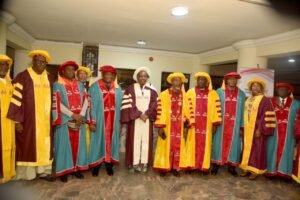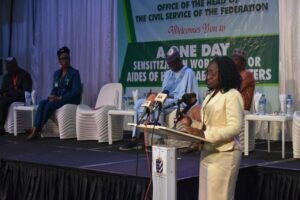NILDS DG canvass coercion powers for NASS
By EricJames Ochigbo
The Director-General of the National Institute for Legislative and Democratic Studies (NILDS) Prof. Abubakar Sulaiman has called for amendment of extant laws to give power of coercion to the Legislature.
The DG who stated this in an interview in Abuja, said that the Legislature which often suffers casualty under military rule is evolving when compared to other arms of government.
He said rather than blaming the arm of government for its inadequacies, there was the need to look at the extant laws to see where the parliament can be empowered to be more efficient.
“The legislature is evolving, their duty is to make laws, oversight and represent and speak for their people; in the cause of their public hearings, they have powers summon but they do not have powers to enforce.
“They do not have powers to compel or powers of coercion, the instrument of coercion is not in the hands of the Legislature but in the Executive.
“We have seen when the Inspector-General of Police, Comptroller-General of Customs and other director-general were summoned and they refused to appear.
“The power of enforcement is a major problem, as long as they do not have the power of compliance, that is where the gap is and it not what we should blame the parliament for but we need to say no, it has to stop.
“We should look at the extant law that set it up, the legal framework and see where we can tinker with it in a way that we can give them more power,’’ he said.
Contrary to public opinion, Sulaiman said that the National Assembly is underfunded saying that there is need for more funding to enable the parliament live up to expectation.
The director-General said that the just concluded NILDS conference on women in governance was informed by the poor result of women representation in governance following the outcome of the 2023 general election.
He said that in the National Assembly between 2019 and 2023, there were nine women at the Senate and 15 at the House of Representatives.
Sulaiman said that there was also a reasonable level of women participation in governance at state legislatures and federal levels.
He added that there was high clamour for more women participation in governance and there were a lot of engagements and protests to that effect but a lesser number were recorded across the nation.
Sulaiman said that the conference was to ask questions on the methodology and to find out what went wrong in spite of all the clamours before advocacy ahead of 2027 commences.
He said that the conference was well attended by the leadership of the National Assembly, people from the academia, politicians and other experts from Kenya, Uganda and other African countries.
He said that the leadership of both chambers of the National Assembly are set to change the narratives saying that Nigerian women would no longer be there as electorates alone but participants in governance.
He said that for more women to participate in governance, there is need for them to join political parties and lobby the men with the right terms.
He said that under President Goodluck Jonathan, women representation was at about 30 per cent but dropped to less than 15 per cent under President Muhammadu Buhari expressing hope that President Bola Tinubu will do better.
He said that as part of the outcome of the conference, bills aimed at ensuring legal framework to facilitate women in governance will be drafted and women will be trained and empowered to participate.




